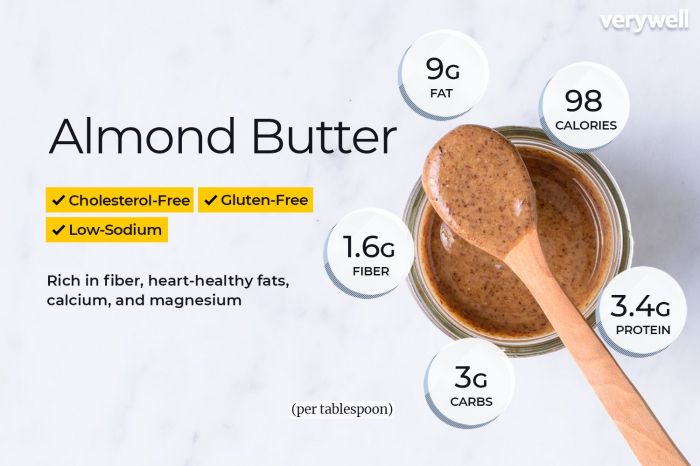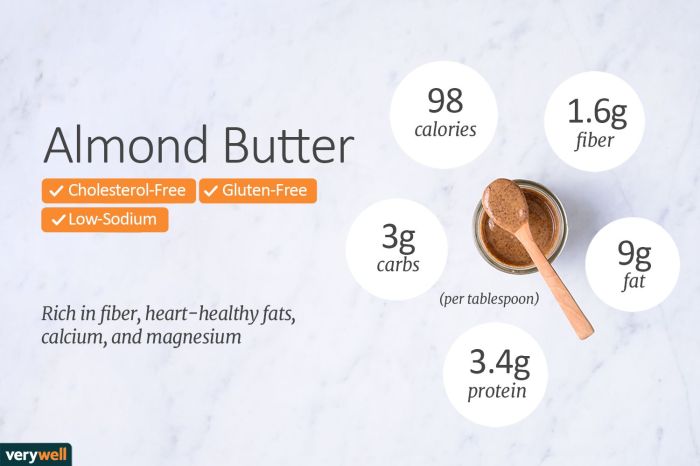Nutritional Composition of Almond Butter
Nutrition facts almond butter – Almond butter, a popular and versatile spread, packs a nutritional punch, making it a favored snack among health-conscious individuals in Makassar and beyond. Its rich profile of healthy fats, protein, and essential vitamins and minerals contributes to its widespread appeal. Let’s delve into the specifics of its nutritional composition.
Macronutrient Breakdown of Almond Butter
The macronutrient content of almond butter varies slightly depending on the brand and processing methods. However, a typical serving size (about 2 tablespoons or 32 grams) provides a balanced mix of protein, fat, and carbohydrates. The following table illustrates this:
| Nutrient | Amount per Serving (32g) | % Daily Value | Units |
|---|---|---|---|
| Protein | 7g | 14% | grams |
| Fat | 19g | 29% | grams |
| Carbohydrates | 6g | 2% | grams |
Note: Daily values are based on a 2000 calorie diet. Individual needs may vary.
Fat Content and Health Implications
Almond butter is predominantly composed of healthy fats, primarily monounsaturated and polyunsaturated fats. These fats are considered beneficial for cardiovascular health, helping to lower LDL (“bad”) cholesterol and raise HDL (“good”) cholesterol levels. A smaller percentage consists of saturated fat, which should be consumed in moderation as part of a balanced diet. The specific breakdown varies, but a general ratio would show a higher proportion of monounsaturated and polyunsaturated fats compared to saturated fat.
This favorable fat profile contributes to almond butter’s overall health benefits.
Micronutrient Content of Almond Butter
Almond butter is also a good source of several essential vitamins and minerals. These contribute to various bodily functions and overall well-being. The presence of these micronutrients further enhances the nutritional value of almond butter.
Consumers seeking healthy alternatives often check nutrition facts for almond butter, comparing its protein and healthy fat content to other snacks. However, a direct comparison might involve looking at the nutritional profile of popular treats like those found in nestles chocolate chips nutrition facts , to understand the significant differences in sugar and calorie content. Ultimately, understanding both sets of nutrition facts helps make informed choices about dietary balance.
- Vitamin E: A potent antioxidant that protects cells from damage.
- Magnesium: Essential for muscle and nerve function, blood sugar control, and blood pressure regulation.
- Potassium: Plays a crucial role in maintaining healthy blood pressure and fluid balance.
- Phosphorus: Important for bone health and energy production.
- Vitamin B2 (Riboflavin): Contributes to energy metabolism and healthy skin.
Health Benefits Associated with Almond Butter Consumption

Almond butter, a creamy and delicious spread made from roasted almonds, offers a surprising array of health benefits beyond its satisfying taste. It’s a powerhouse of nutrients, contributing positively to various aspects of well-being, from cardiovascular health to weight management and the prevention of chronic diseases. Let’s delve into the specifics of how this nutty treat can boost your overall health.
Almond Butter and Heart Health
Almond butter’s positive impact on heart health is largely attributed to its rich profile of monounsaturated fats, fiber, and vitamin E. These components work synergistically to improve cholesterol levels and manage blood pressure. Monounsaturated fats help lower LDL (“bad”) cholesterol while raising HDL (“good”) cholesterol, reducing the risk of atherosclerosis (hardening of the arteries). The fiber content promotes healthy digestion and helps regulate cholesterol absorption.
Vitamin E, a potent antioxidant, protects cells from damage caused by free radicals, further contributing to cardiovascular well-being. Studies have shown a correlation between regular almond consumption and a reduced risk of coronary heart disease. For example, a study published in the
Journal of the American Heart Association* found that individuals who incorporated almonds into their diet experienced a significant decrease in LDL cholesterol levels.
Almond Butter’s Role in Weight Management, Nutrition facts almond butter
While almond butter is calorie-dense, its high protein and fiber content contribute to increased satiety, meaning it keeps you feeling full for longer. This can be particularly beneficial for weight management as it reduces overall calorie intake throughout the day. The healthy fats in almond butter also help regulate appetite hormones, further supporting weight control efforts. Unlike many processed snacks, almond butter provides sustained energy without the subsequent energy crash, preventing overeating.
Imagine replacing a sugary snack with a small portion of almond butter on whole-wheat toast – the sustained energy and satiety will help you feel fuller for longer and reduce cravings. This makes it a smart choice for those seeking a balanced and effective approach to weight management.
Almond Butter and Reduced Risk of Chronic Diseases
Research suggests a link between regular almond consumption and a decreased risk of developing type 2 diabetes. The high fiber content in almond butter helps regulate blood sugar levels, preventing sharp spikes and crashes that can contribute to insulin resistance. Furthermore, the magnesium in almonds plays a crucial role in insulin function and glucose metabolism. The healthy fats and antioxidants in almond butter also contribute to overall metabolic health, reducing the risk of developing metabolic syndrome, a cluster of conditions that increase the risk of heart disease, stroke, and type 2 diabetes.
A meta-analysis of several studies showed a consistent association between nut consumption, including almonds, and a reduced risk of type 2 diabetes. This underscores the importance of incorporating nutrient-rich foods like almond butter into a balanced diet to promote long-term health.
Potential Drawbacks and Considerations: Nutrition Facts Almond Butter

Enjoying almond butter is all part of a balanced lifestyle, but like anything delicious, moderation is key, especially in Makassar where we love our tasty treats! Overdoing it can lead to some unexpected downsides, so let’s explore them.Excessive almond butter consumption can pack on the calories pretty quickly. A spoonful here, a dollop there, and before you know it, you’ve surpassed your daily calorie goals.
Remember, even healthy fats are high in calories. This can contribute to weight gain if not balanced with a healthy diet and regular exercise. Also, allergic reactions to almonds are a genuine concern for some individuals. Symptoms can range from mild skin rashes to severe anaphylaxis, requiring immediate medical attention. Always be mindful of potential allergies, especially if you’re introducing almond butter to your diet for the first time.
Added Sugars and Unhealthy Fats
Choosing the right almond butter is crucial. Many brands add extra sugar and unhealthy saturated and trans fats to enhance taste and shelf life. These additions significantly reduce the nutritional benefits of the almond butter and can negatively impact your health. Look for brands that contain only roasted almonds with minimal or no added ingredients. Reading nutrition labels carefully and comparing different brands is important to identify those with the lowest sugar and healthiest fat profiles.
For example, comparing two brands, one might have 5g of added sugar per serving while another has none. That’s a big difference!
Safe Storage Practices
Proper storage is vital to maintain the quality and freshness of your almond butter. Almond butter, like other nut butters, can become rancid if exposed to air, light, and heat. Storing it in an airtight container in a cool, dark, and dry place is the best way to preserve its flavor and nutritional value. Refrigerating almond butter can extend its shelf life, but it may slightly alter its consistency, making it firmer.
Pay attention to the “best by” date on the label, but remember that even after this date, it might still be safe to consume if properly stored and doesn’t show signs of rancidity (off odor or taste). Imagine leaving your almond butter in a hot car all day – that’s a recipe for spoilage!
Quick FAQs
Is almond butter good for weight loss?
While calorie-dense, almond butter’s healthy fats and protein promote satiety, potentially aiding weight management when consumed in moderation as part of a balanced diet.
Can I eat almond butter every day?
Daily consumption is possible, but moderation is key due to its calorie content. Aim for a serving size recommended on the label and be mindful of added sugars or unhealthy fats.
Does almond butter go bad?
Almond butter can last for months unopened, but once opened, store it in the refrigerator to maintain freshness and prevent rancidity. Look for changes in texture or smell as indicators of spoilage.
What are the best brands of almond butter?
Many brands offer high-quality almond butter. Look for options with minimal added ingredients, focusing on those with only almonds (or almonds and a small amount of salt) as ingredients.
